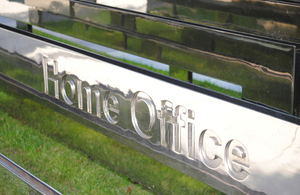Two new "legal highs" to be banned under temporary order
Two new so-called “legal highs” have been banned by the Government.

Home Office
As the Psychoactive Substances Bill makes its way through Parliament, these two new drugs will be illegal from today (27 June) for up to 12 months while the independent Advisory Council on the Misuse of Drugs (ACMD) decides whether they should be permanently controlled.
In April, the Government accepted the ACMD’s advice to make a Temporary Class Drug Order (TCDO) on five compounds related to methylphenidate, a Class B drug, due to concerns about their misuse as new psychoactive substances (NPS).
During the ACMD’s evidence gathering process for permanent control, two further related substances were found for sale online as replacements for the initial five controlled in April.
As a public protection measure the ACMD has recommended that the two compounds – 4-Methylmethylphenidate and Ethylnaphthidate – should be added to a new TCDO, alongside the original five substances, while it continues to gather evidence for permanent control advice.
The five drugs banned in April, and which will continue to be banned under the new TCDO including their salts and preparations are; Ethylphenidate, 3, 4-Dichloromethylphenidate (‘3,4-DCMP’), Methylnaphthidate, Isopropylphenidate and Propylphenidate.
Ethylphenidate has emerged as an alternative to cocaine and is sold using the street names ‘Gogaine’ and ‘Burst’.
Users have been known to inject the drug, putting themselves at risk of blood-borne disease and infection.
Minister for Policing, Crime, Criminal Justice and Victims Mike Penning said:
We are determined to protect young people from the dangers of so-called “legal highs” and target those who profit from their trade.
That’s why we created the Forensic Early Warning System to identify substances previously unseen in the UK and we have banned more than 500 new drugs, including those controlled today.
Our landmark Psychoactive Substances Bill will also fundamentally change the way we tackle new psychoactive substances.
The blanket ban will give law enforcement agencies and local authorities greater powers to tackle the reckless trade, instead of having to take a substance-by-substance approach.
The TCDO is published today (27 June) and the substances become illegal at 00:01 on 27 June.
A TCDO controls the supply, production and importation/exportation, excluding the simple possession, of a drug to protect the public from the harms of the drug while the ACMD make a full assessment of its harms for consideration for permanent control as a Class A, B or C drug under the 1971 Act.
Once the order is in force, anyone caught making, supplying or importing the drugs will face up to 14 years in prison and an unlimited fine under the Misuse of Drugs Act 1971.
Police and border officials will be allowed to search or detain anyone they suspect of having the drugs and seize, keep or dispose of a substance they think is a temporary class drug.